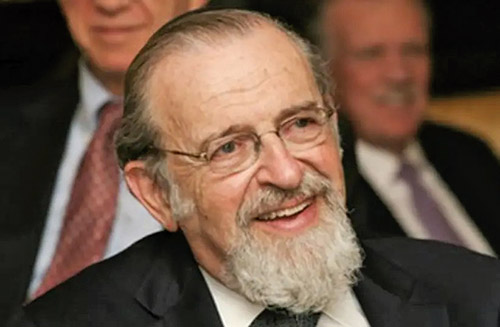
Editor’s note: The Jewish Link was saddened to hear of the petira of Rabbi Lamm early this week. Rabbi Fridman provided just one of several appreciations we received. Please read all the early tributes on pages 60 and 61.
As is well known, Rabbi Dr. Norman Lamm, z”l, served as past president and chancellor of Yeshiva University, and rosh hayeshiva of Yeshivat Rabbenu Yitzchak Elchanan. Prior to that, Rabbi Lamm served congregations in Springfield, Massachusetts, and The Jewish Center, on the Upper West Side of Manhattan. Rabbi Lamm was the founding editor of Tradition, the quarterly journal of the Rabbinical Council of America.
Rabbi Dr. Lamm, a leading disciple of Rabbi Joseph B. Soloveitchik, brought unsurpassed eloquence, in both his written and spoken word, to articulating the philosophy of Torah U’Madda, and personified immersion in Torah synthesized with thoughtful and critical engagement in the modern world. Indeed, he was the rabbi-scholar-community leader par excellence. Our broader community is deeply indebted to Rabbi Lamm for his singular contributions to the institutions and worldview which, for so many of us, serve as the foundation of our spiritual lives.
Rabbi Dr. Lamm’s passing on this isru chag Shavuot, an otherwise mundane day, but one which is suffused with elements of the sacred day of kabbalat haTorah that preceded it, is deeply symbolic. Such was his weltanschauung: a perspective rooted in the eternal sanctity of
Torah, can and must impact and influence how we interact with the mundane.
Similarly, his passing at a moment of profound turbulence for our nation, both with respect to the pandemic that claimed his beloved wife just over a month ago, as well as the riots and racial tensions that have boiled over in response to the murder of George Floyd, remind us of how Rabbi Lamm brought deep Torah wisdom, nuance and balance to bear on the major issues of the day for over half a century of public life, whether it was his famous sermon in the wake of the assasination of President Kennedy, or his addressing the civil rights issues of the day.
Those of us generations his junior who aspire to conduct our rabbinate along similar lines can only aspire to his lofty standards and redouble our efforts to continue his sterling legacy of rabbinic engagement, through the prism of Torah, in the issues of the day. Indeed, “turn it over, and over again, for all is contained within it.” Authentic commitment to Torah provides us perspective on all that occurs around us.
On a personal level, Rabbi Dr. Lamm was a profound influence on my life. Despite his towering communal stature, he was, in person, unfailingly modest, gentle, self effacing, and wholly unpretentious, a walking testament to our Sages’ statement, “in the place where you find his greatness, there you shall find his modesty.”
When I served as rabbinic intern and resident scholar at The Jewish Center, he would often attend shiurim and lectures I delivered, not because I had very much to teach him, but so that he might contribute to my development. His constructive feedback, gentle critiques and broader guidance regarding congregational life continue to reverberate in my mind.
The deep wisdom he so graciously shared with me was apparent in the moment, but, in retrospect, could only be fully appreciated with the passage of time. Above all, he encouraged me to devote my energies to the communal rabbinate and Torah education, which he believed in so passionately and deeply.
In those years, I was privileged to listen to Rabbi Lamm on walks from his apartment to Shacharit, or on visits to his apartment, when he would share stories regarding the financial plight of Yeshiva at the outset of his presidency, his relationship with and unabashed love and reverence for the Rav, zt”l, as both rebbe and doctoral supervisor (as has been noted, Rabbi Dr. Lamm remained the only person to have both semicha as well as doctoral supervision from the Rav), and many other events of decades past.
I can summarize all of these conversations in two sentences, which I think speak for themselves as it concerns the spiritual core of the Torah leader we just lost: Where there were successes, he credited siyata dishmaya, the guiding hand of Providence; to the extent that there were failures, he ran toward responsibility and accountability. If, today, “leadership” courses and summer programs have become something of a fad, I’m not sure anyone could do better than to try to internalize this dual maxim by which Rabbi Dr. Lamm assessed his communal life.
Rabbi Dr. Lamm was predeceased by his daughter Sara, and, just over a month ago, by his beloved wife, Mrs. Mindella Lamm, of blessed memory. We extend condolences to his children, Chaye (and David) Warburg, Dr. Josh (and Rivkie) Lamm, and Shalom (and Tina) Lamm, the extended Lamm, Warburg and Dratch families, as well as his many grandchildren and great-grandchildren.
May they all be comforted amongst the mourners of Zion and Jerusalem.
Rabbi Daniel Fridman is rabbi of The Jewish Center of Teaneck and a rebbe at TABC










